- Home
- Johnny D. Boggs
A Thousand Texas Longhorns Page 6
A Thousand Texas Longhorns Read online
Page 6
When José Pablo Tsoyio dipped the ladle into the remnants of stew, Chase said, “What are you doin’?”
Sadly, the old man turned. “I . . .” He offered the smile of the meek. “I am hungry, too, my friends. It has been a long day. A very hot day. I . . .”
“This meal is for white folks, greaser,” Chase said.
Big Bobby Cupid laughed. “I think I left your supper out by the porch. In the dirt.”
The men around the table giggled over their bowls. One dipped a biscuit into the stew, and bit off a chunk.
“Forgive me,” José Pablo Tsoyio said. “I forgot.”
“Yeah.”
“Tastes good,” one of the gringos said.
“Make sure breakfast is even better,” Big Bobby Cupid said.
“Hey,” one of the cowboys said, “you didn’t bleed in this stew, did you, boy?”
“No.” José Pablo Tsoyio’s head shook. “No, señor.”
“Good. I don’t like blood in my goat stew.”
“I don’t care for spit in mine,” Chase mumbled.
“Huh?”
“Nothin’.”
“Well, go on, Ramos,” the one with curly hair said. “Adios. See you in the morning.”
After a slight bow, José Pablo Tsoyio stepped out of the bunkhouse and into the fading daylight. He looked at the barn, where he slept in the loft, and moved in that direction.
“Hey, you ignorant bean-eater,” Big Bobby Cupid said. “Shut the damned door. I don’t want flies in my stew.”
“Sí. Yes.” The right leg hurt as José Pablo Tsoyio turned around, limped, and pulled the door shut.
Slowly, he moved toward the barn, looking at the horses in the corral, picking the one he would take, the high-stepping dapple whose brand had been altered by that artist in the bunkhouse. José Pablo Tsoyio knew which saddle he would steal, too. Just before he stepped through the barn’s open door, he glanced again at the bunkhouse. Studying the sky, he lifted his wooden crucifix, kissed it, thanked the spirits for their wisdom. Closing the door was a most wonderful thing, something José Pablo Tsoyio had not considered. He fingered his split lip, which no longer hurt so much, and went to the peg that held the good saddle, the saddle that would befit a caballero riding for Don Sebastian Degallato. Yes, this would do nicely. Even the stirrup lengths would not need adjusting. He climbed to the loft, gathered his gear, bedroll, stiletto, and the .44-caliber Dance revolver he had won in a game of Spanish monte.
Once back down, he moved to the corner of the door and looked toward the bunkhouse. To wait. Maybe till sundown. If no one came out by then, he would saddle the dapple and ride. North. Yes, north. North and perhaps he could go back to using the name his madre and padre had blessed him with: José Pablo Tsoyio.
If he thought about it, he would find a church on the ride north. A priest who would hear his confession. But not about what happened here, this evening, for José Pablo Tsoyio had not sinned. Closing the door had saved him from that mistake.
Imagine, he thought as he began to roll a cigarette. What a tragedy it would be for some coyote or wolf to be lured by the scents from the bunkhouse, enter, and eat the flesh of the dead men inside. Would the poison have also killed some poor, innocent animal?
José Pablo Tsoyio did not know. But now it did not matter, for it would not happen. Striking a match, he lighted his cigarette, inhaled, held the smoke, and blew a smoke ring toward the loft. The Dance rested on his lap. No sound came from the bunkhouse.
CHAPTER TEN
Mason Boone’s eyes popped open, and he listened in the darkness, smelling hay, and himself—for he had voted against that bath, what with the snow coming down again—and decided he had been dreaming. He reached up, smoothed what he could of his mustache, and plucked something from the hair. Holding it between forefinger and thumb, he brought it to his nostril and sniffed.
That, he thought as he grinned, was not a dream. He popped the morsel into his mouth.
That black-haired woman sure knew how to bake a pie.
“Man’s got a comeuppance coming.”
The voice came from below. And this, Boone understood, was no dream. It belonged to Plummer with the Goatee. If the kid still donned theatrical makeup.
“We all got a comeuppance coming.” That would be Sandy.
“Not as much as No Good Story,” Plummer said.
“The McGees fought a good fight. They just lost. I ain’t one for revenge, not when revenge can get me kilt.” That voice, that was something new. Didn’t sound like any one of the fools who had tried to stop the vigilance committee from stringing up those three criminals at the potter’s field overlooking Virginia City. But Boone figured most of that crew had likely made a beeline for Canada, Fort Hall, maybe Tyler, Texas—as far away as they could get from a hangman’s noose.
“This ain’t about vengeance, boys,” Plummer said. “It’s about profit.”
“Meaning?” That voice was spoken too softly, and the wind had started to pick up, so Boone didn’t know if that came from one of the original gang, or some conglomerate.
Plummer didn’t answer, or if he did, he just whispered.
“Well?” Sandy said.
A cork popped. Boone wondered what they might be drinking. Rye? Bourbon. Taos lightning. He frowned. If those sons of bitches mess up that stall so that skinflint won’t pay me my two dollars, I’ll fix their flints something good.
“He’s cashing out,” Plummer said.
“You mean he’s leaving Vagina City?”
Chuckles echoed the joke.
“Leaving,” Plummer said, “on the next stage for Salt Lake.”
“This gossip?” one of the new voices said.
“Straight from the mouth of the mule himself,” Plummer answered.
A snort and a laugh. “He up and tell you that directly?” Again, that was Sandy.
“I pay attention when I’m swamping a saloon,” Plummer said. “I ain’t just trying to earn enough for a meal.”
“And a poke,” one of the conglomerates added.
A few laughed. Plummer ended that with a savage curse.
“He was talking to Mr. Nowlan.”
“The banker?” Sandy asked.
“Yep.”
“Story didn’t recognize you?” someone asked.
“Nobody pays mind to someone pushing a broom in a saloon,” Plummer said.
“They ought to. Lucius Matthews collected a right smart of gold dust sweeping out saloons.”
Again, Plummer cursed. His gang fell silent. “He’s taking his gold, and most of his money, to New York City.”
“Ain’t the Salt Lake banks good enough for him?”
“If you peckerwoods read the Post, you’d know that every politician and businessman is bound east, trying to get the politicians to make Montana a state.”
Someone laughed. “They’d do that in Washington City, pal, not New York.”
“But the banks are in New York.”
“Well, San Francisco’s a mite closer,” Sandy said.
“He ain’t getting to San Francisco. Or New York. Or Salt Lake City. He’s going to hell. And I’m gonna send him there. And all of us will be richer than kings.”
Boone raised his right hand to his head, felt along the top, found the tender spot where Nelson “No Good” Story had tried to split his skull. He pictured the tall man, showing not a flitter of fear, moving from one wagon to another, kicking out crates, hanging three men. Boone didn’t even know what the McGee boys had been accused of. His stomach seesawed.
A man like that, Boone thought, wouldn’t have skedaddled after Kennesaw Mountain. He changed that thought. If he was so brave, how come he has been up here during the whole damned war and not fighting for one side or the other?
He smoothed his hair, grimacing a couple of times, and brought his hand down his face, stopping at the end of his nose. He sniffed, but found no fragrance of dried-peach pie, just horse dung, straw, and the wretched stink of what had bec
ome Mason Boone.
“I don’t know,” someone was whining below the loft. Sandy. Boone recognized the voice. “We ain’t never done nothing like this before. Nothing this . . . bold.”
“Yeah,” said one of the newbies. “I don’t know, either.”
“I do,” Plummer said, and a revolver cocked.
* * *
“You done all this?” Old man Brill shook his head. “After I left? Your . . . ownself?”
“Yes, sir,” Boone answered impatiently.
“Huh.” The man spit into a bucket. “Well, I’d say that’s two dollars’ worth of cleanin’.” He gestured to the office. “Come on inside, bub. I’ll pay you in gold dust.”
Once settled, Brill opened a drawer, pulled out a key, started to shut the drawer, laid the key on some papers, and withdrew the spoon. He held it up. “You wash this, too?”
“Yes, sir.”
“Pie any good?”
“Yes, sir.”
“You in a hurry, boy?”
“Yes, sir.”
The spoon rattled as it fell back in the drawer, which the old man slammed, and muttered, “Ever’body these days is in such a dad-blasted hurry. All they’re doin’ is hurryin’ ’emselves into a hole six foot deep.” He rose, turned, and whirled around. “Close your eyes. Tight. All right. No peekin’.”
Feeling like an idiot, Boone stood there, sighed once, but kept his eyes shut. Something rattled. The old man grunted. Footsteps sounded, and metal slammed on wood. “All right, bub. You can look.”
When Boone’s eyes opened, he stared down the barrel of a Colt Dragoon. “Now, don’t you try nothin’ fancy, bub. I’m payin’ you what I owes you, and that’s it. You think you deserve a bonus, you’ll get that in lead. Savvy?”
“All I want,” Boone said steadily, “is two dollars.”
“Comin’ up.” The man laid the cocked revolver by a tin box, found the key, opened it, and withdrew a pouch. Then he opened a larger drawer, slammed it shut, and cussed, “Where the hell did I leave ’em scales?”
Boone waited till what felt like February, but the man finally cried out, “Eureka,” and brought the scales to the desk. He nodded at Boone and began tapping dust onto one side. Boone stepped closer, just enough, and kept his hands wide apart. Old Brill barely noticed, and Boone could have swept the Dragoon off the desk, crushed the old-timer’s skull, and walked out with a fortune—a fortune anywhere but Virginia City. Instead, he watched the old man’s thumbs. Just waited for Brill to cheat him. Like most of the bosses Boone had worked for in Montana Territory.
Finally, Brill dropped the pouch back into the tin box, pulled another pouch from another drawer, and carefully brushed the dust into it, after which, he drew the string and tossed the small pouch to Boone.
“Paid in full.”
Boone just stared.
“Don’t tell me you want a receipt.”
Boone felt the pouch, looked at the scales, and finally at the old man, who shrugged and locked the box, tossed the key into a drawer, reached for the Dragoon, and lowered the .44’s hammer.
“This is more than two dollars.”
“Well, arithmetic never was my strong suit.”
“I don’t understand.”
“Blame it on St. Vincent de Paul. And them damned nuns.”
Boone blinked.
“You didn’t take a bath,” the old man said.
“It was too cold.”
“You sleep all right?”
Boone shrugged.
“Well, there’s enough in what I paid you for a bath. Maybe some clean duds. And money for breakfast. After that, I’d say you maybe have two dollars. You done a good job, boy. But you could save yourself some money if you was to take a bath here. I know, it ain’t much. But it cleans me good enough. And don’t think I’m some deviant. I’ll be outside, watching this town dry up and blow away. Not lookin’ at you, all envious, in your birthday suit.”
Boone shook his head. “I don’t understand.”
“It’s called charity, bub,” the old man roared. “That’s what St. Vincent is all about. It’s because I’m an old man and a damned poor businessman. And this here place ain’t never been so clean. Go on, I’m expectin’ a busy morn’. Gonna count my farts. Get out of here. And stay away from the roulette wheels. But if you strike a fortune, come buy me out. I got me a hankerin’ to see what Mexico looks like. Might be a good place to thaw out.”
Numbly, Boone stepped outside. The blast of cold wind slapped the senses back into him, and he hurried toward Wallace Street.
CHAPTER ELEVEN
“Nelson?”
No answer. Good, Ellen Story thought, before she slipped through the doorway to their cabin, pulled the door closed, dropped the empty platter, pitched her pouch filled with profits onto the settee, and shed shawl, coat, hat, and gloves. The room spun, and she leaned against the rough log wall, praying for the dizziness to pass. She never would make it to the outhouse behind the cabin. She’d never even reach the winter kitchen. She tried for the fireplace, but barely got to the kindling bucket before dropping to her knees, bending over, and retching.
She had only her blouse sleeves to wipe her mouth, after which she lifted her head and stared at her cabin. It wasn’t much. Spartan, like many Virginia City homes, but better than the tent they had in Bannack City after first reaching the territory back in ’63. Anticipating the San Francisco of Idaho Territory, they had found a rough-hewn village practically deserted, causing Ellen to snap at Nelson. Three months of suffering on the trail to come to . . . this? This time, Nelson had reined in his temper before leaving to investigate, so eventually, they had followed the miners to this new strike in Alder Gulch.
“He don’t drink,” her father says. “Not much, nohow. Got a mind for business. Ambition enough for an army. And I see his eyes holding on you when he’s loading wood for me. Worse men in Kansas, daughter.”
“Are you trying to marry me off, Papa?”
“I’m just thinking aloud, daughter. Go bring him some water. He’s sweating like a field hand.”
The memory passed. She leaned forward toward the bucket, but this time, God spared her the ignominy of vomiting on kindling.
* * *
Everyone in the Fourteen Mile City proclaimed Nelson Story as one proud man, ramrod straight, utterly fearless, but few understood just how deep Ellen’s pride reached. So the last thing she wanted to hear was someone tapping at the front door. God help her, she prayed whoever stood outside had not heard her gagging and vomiting and, being neighborly, just wanted to check on her.
Dear Lord, her silent prayer continued, send this visitor somewhere else. Please, in all your mercy, spare . . .
The door pushed open. “Anybody home?” a voice drawled.
“Ohhhh.” The groan was audible. The door had failed to close all the way. She had been in too big a hurry.
Ellen wanted to die. Instead, she dropped her head and vomited. Again.
Shaving tonic almost gagged her, and she started to slip into a void, but strong hands caught her. Squeezing her eyes shut, she swallowed down bile and made herself look into the face of a young man, clean-shaven except for a mustache.
“Ma’am, I got to get you to a doctor,” the man said. Dark eyes. Like her own. But brown hair, not black.
“No,” she managed. “I’m fine.”
“You’re sick, ma’am.”
“It’ll pass. It’s . . .” Well, there was no need to bore a total stranger with any particulars. And if Nelson happened to come in, he’d thrash the man before she could explain what was happening.
What was happening? What was a complete stranger doing in her house? Maybe . . . perhaps . . . yes, he must have been passing by when he heard the . . .
Ellen almost vomited again.
“I’m gonna get you . . .”
“The chaise.” Feebly, she gestured.
The stranger’s head turned. She whispered, “Just get me there.”
He lifte
d her and carried her to the daybed, that wedding present from her father, of burl walnut and yellow fabric. Nelson had wanted to sell it in Denver, for it had taken up most of the tent they had pitched on their journey west, but her will could best his on particular points. The stranger, knight, figment of her imagination, he eased her onto the sofa, resting her head on the side. His knees were on the rug, and she saw the top of his head.
“Oh. I know . . . you’re . . .”
“Can I get you something to drink, ma’am?” he asked as he rose, still on his knees, but straightening. “You got brandy?”
“Water, maybe.” Her breathing had not steadied. “Pitcher. Table.”
When he moved toward the dining table, she tried to get up, to run for the door, but she couldn’t even lift an arm. He was back, tin cup in his hand, and he held it toward her. She smiled weakly, and he understood, sat on the edge of the chaise, lifted her head, and brought the cup to her lips.
“Thank you,” she said.
“You’re welcome.” He looked around the cabin. To see what was worth stealing? Not much. No money here, not enough worth stealing, anyway. No weapons. About the only thing of value Ellen happened to be lying on. In the cabin, Nelson had finally gotten around to tacking muslin, smoothed and stretched, on the inside walls, to hide the logs, make it look like these walls were plastered. And sometimes it did seem that way, but only in darkness. When you were bone-tired. Other homeowners had put up false fronts outside of their houses, some had managed to add columns, or what resembled columns, and arches. A few had nailed medallions.
The man’s dark eyes landed back on Ellen. He still held the hat, a new hat, hardly a speck of dust on brim or crown, in his left hand.
He wore tan woolen trousers stuck inside tall boots, a blue shirt, and a long woolen scarf—maybe a sash used as a scarf—of reddish orange with thin white stripes trimmed in blue. She couldn’t tell if he wore a vest, or a gun belt, for the double-breasted, maroon greatcoat remained buttoned. As her father had once told Nelson, “You clean up pretty good, young fellow.” She was about to tell him that when she felt it. She gasped, her eyes widening, and brought her hands to her stomach.

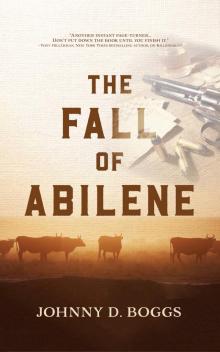 The Fall of Abilene
The Fall of Abilene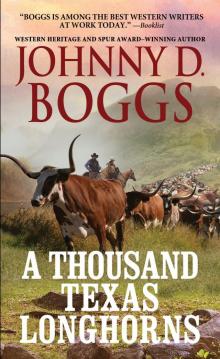 A Thousand Texas Longhorns
A Thousand Texas Longhorns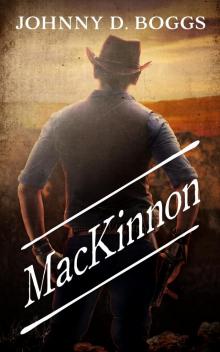 MacKinnon
MacKinnon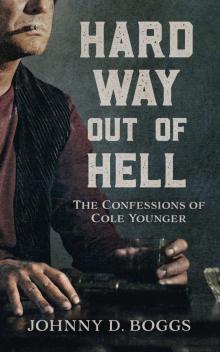 Hard Way Out of Hell
Hard Way Out of Hell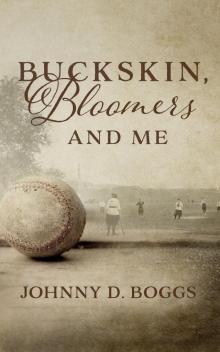 Buckskin, Bloomers, and Me
Buckskin, Bloomers, and Me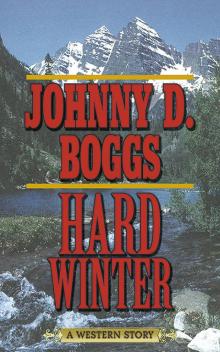 Hard Winter
Hard Winter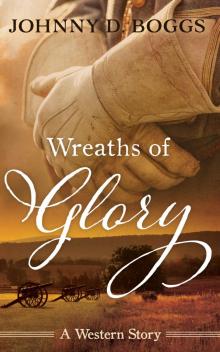 Wreaths of Glory
Wreaths of Glory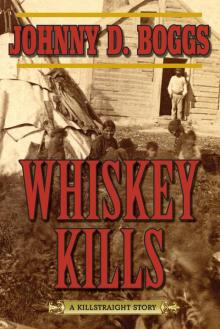 Whiskey Kills
Whiskey Kills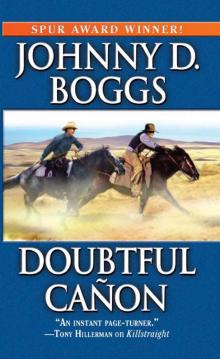 Doubtful Canon
Doubtful Canon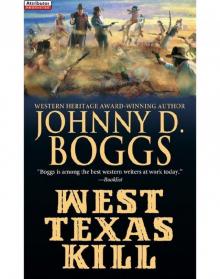 West Texas Kill
West Texas Kill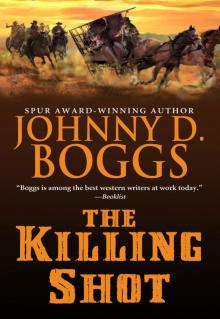 The Killing Shot
The Killing Shot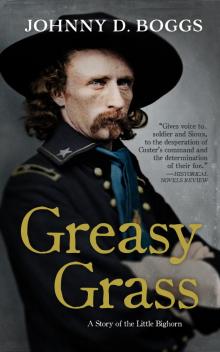 Greasy Grass
Greasy Grass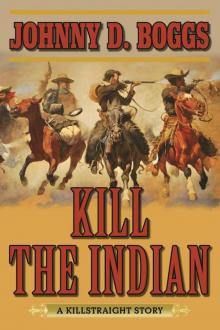 Kill the Indian
Kill the Indian Return to Red River
Return to Red River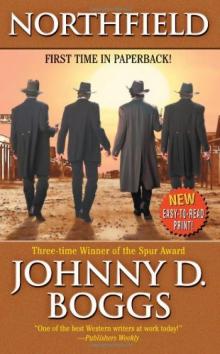 Northfield
Northfield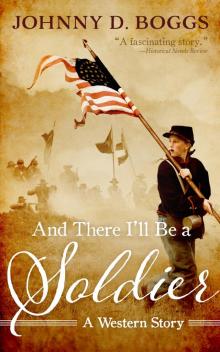 And There I’ll Be a Soldier
And There I’ll Be a Soldier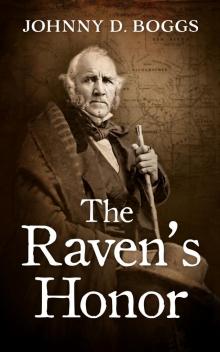 The Raven's Honor
The Raven's Honor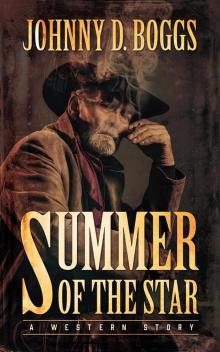 Summer of the Star
Summer of the Star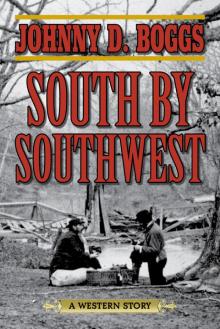 South by Southwest
South by Southwest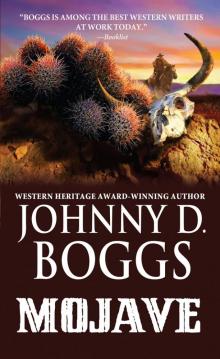 Mojave
Mojave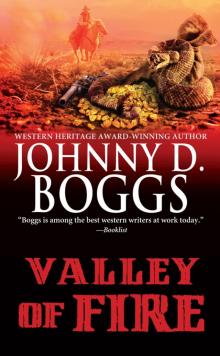 Valley of Fire
Valley of Fire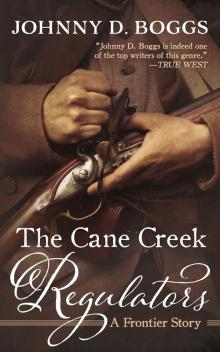 The Cane Creek Regulators
The Cane Creek Regulators